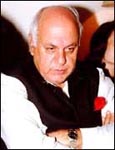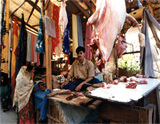The Rediff Special/Chindu Sreedharan
'The Kashmir situation is now moving at its own momentum'
 Farooq Abdullah has just finished an eventful year in power.
His election last October was promoted as a return to peace, to the tranquility of the past.
Farooq Abdullah has just finished an eventful year in power.
His election last October was promoted as a return to peace, to the tranquility of the past.
But has life really changed in the valley? Has peace really returned to Kashmir?
Chindu Sreedharan found out.
No doubt, Kashmir is normal again.
See, it is now late evening here in Srinagar and there are
people out on the streets still --
isn't that pretty normal?
See, that's the Dal lake there, lit up like a Christmas tree. With rows upon
rows of
colourful houseboats bobbing gently... and scores of shikaras flitting across like
shadowy swans -- isn't this how it used to be before?
See over there, there along the lakeside. Those are casual strollers, tourists! With no purpose in mind than get some evening breeze and, may be, take a ride over the lake
if the bargain is real good --
now, isn't that a sure sign of returning normalcy?
And see these people hurrying home. They are teachers, technicians, government
servants... Returning from a day's work at offices which, in
the past year, have seen rising
attendance.
So Dr Farooq Abdullah has kept his promise -- Kashmir is all normal again, isn't it?
Sure. One year after the National Conference government took over, the
state, as Dr Abdullah desperately tries to project, is fast on the road to peace -- that is, if you don't scratch the surface. And refuse to feel the electric tension in the air.
Move out from the town a little bit. Along any road, any side. See the road opening
parties there, the hundreds of AK-47-totting, bullet-proof-jacketed securitymen at regular intervals. See the bunkers and sandbags near every bridge...
 Or, take a look at the airport. Count the time you
need to spend on security check,
the number of body and luggage frisks that's dealt out there.
Or, take a look at the airport. Count the time you
need to spend on security check,
the number of body and luggage frisks that's dealt out there.
Now, move back to the city for a closer look. See the spotlights probing
the Dal lake area. See the green-clothed
patrols that form the background of the city, the bunkers that
grow out of the landscape.
Normal, are these all?
But then, these are the cloudy pictures. The
silver ones are the more visible: The open shops, the strolling tourists, the unshuttered windows, the unbarricaded doors...
And combined, they do paint a picture, don't they? Of normalcy and peace? Granted, it's
a fragile sort of peace -- a deceiving one, rather -- which, for the
uninitiated, is almost as frightening as violence itself. Granted, too, it's like a ticking
time-bomb. But it's peace nonetheless, isn't it?
Yes, things have improved, Kashmiris agree
unanimously. Tourists are trickling in, the educational system is limping along
fine and the shadow of gun is not that prominent.
"You will take my words with a pinch of salt, I
know," says state Director of Information
K B Jandial, "But believe me, the situation has changed remarkably.
Today, I can reach my
office without trouble. I can sit there without fear and I can stay back as late as I want to!"
On the tourism front, travellers are
now finding the valley if not a safe proposition, one that's worth the
risk. The floundering industry saw nearly
4,000 foreign and 337 domestic
visitors in the first five months of the year. Thus, hundreds of
houseboats on Dal lake have been decked up, the lake itself spring-cleaned in a long while,
and the shikaras are back in business.
"Business has picked up. We have nine
boats on the lake. Now it looks like it is going to be
worth keeping them," confirms Dilip, a houseboat owner, "Though we are
not even half-booked in the season, we do get a fair amount of tourists."
The houseboats, he adds, like many of the hotels in the valley, are offering 50 per cent
discount to attract tourists.
Naturally, other tourist-related businesses have also improved. Says
Ali Mohammed, a taxi driver in Srinagar: "It is a little better now. If you are lucky,
you can even get Rs 2,000 to Rs 2,500 a month."
The sum, he is quick to
add, was what he used to make in five days flat before 1990!
The schools and colleges in the valley, though most of them tightly secured from outside,
are clocking regular, uninterrupted working days. Exams are conducted
on time, the attendance has shot up, and the authorities have
even started taking children out on picnics (an activity which had been banned by the militants).
"This year, we have not been 'ordered' to give admission to any
militant's child. And nobody has come to us for donations," says the authorities
of a private school in Srinagar, "You know, we used to have to pay tens of thousand
rupees every year to the militants before? Dr Abdullah has done a miracle..."
Oh? Has he now? But that is not the feedback you get from
many, including the majority of those who admit the situation has really improved.
"No!" they are unanimous in their denial, "It is no thanks to the CM!"
"The government says they are doing great things," Mohammed says, "Magar karte hain kuch nahin. Look at the roads!"
"He (Dr Abdullah) is a shrewd man," adds a government
servant, "What he wants more than normalcy is to give the impression of normalcy. He has not kept his election promises to tackle unemployment, nor has he even tackled the militancy well -- it is the army and paramilitary forces that's doing that. (click here for details)
So what credit does he deserve for this 'normalcy'?"

Dr Abdullah's political opponents, predictably, cry foul about his 'achievements.' "The
National Conference government has done nothing to help the
Kashmiris or their cause," alleges All Party Hurriyat Conference chairman Mirwaiz Omar Farooq. "All he
has done is unleash the security personnel on us in his quest for power..."
If not the NC government, what then brought this fragile peace? Opinions among political experts coincide.
Dr Abdullah did not bring peace, peace brought Dr Abdullah.
"The Kashmir situation is now moving at its
own momentum," explains an observer, "What changes you
see here now has come about on their own accord. When militancy started, people thought results would be around the corner. Now they have realised India is too powerful to defeat militarily and nothing is going
to come out of militancy. Hence the election and a
civilian government."
The active support which the Kashmiris had
earlier provided to militancy is
lacking now -- but the sympathy isn't. Dr Abdullah's biggest failure has been
his inability to win over the common people. In fact, he appears to have done just the opposite with his promises, his statements about the Kashmir issue and his obtrusive security.
Frightening still, is the powerful anti-India feeling
which emanates from many Kashmiris.
"Why should we love India, tell me?" demands a Srinagar resident, "For imposing the NC government on us? Farooq is turning pro-Indians into anti-Indians with his false promises and statements. He is not a mature politician. Who's he to say that Kashmir can go to Pakistan? It is not his father's property!"
"The hate for India is too deep-rooted," she goes on,
"As things stand, even the newborn child
here hates India. It would take a good, mature statesman to remove it. Farooq is not that man."
But isn't one year too short a period for a CM to produce earthshaking results? Aren't the Kashmiris expecting too much from him?
"It is too short for producing big results, yes," she shoots back, "but not too short to
win the goodwill of the people... And then, we have a prime minister who says something today and backtracks tomorrow! We ridicule him -- we are ashamed to have him!"
Another thing which irritates Kashmiris is the authorities's alacrity to proclaim that
everything is 'normal'. Dr Abdullah's recent statements about the army withdrawal
from Kashmir and his rehabilitation plan for Kashmiri pandits are looked upon as gimmicks to give this impression. The government's eagerness has become counterproductive -- people expect a lot and, consequently, feel let down with the truth, they say.
"The people have now come
to realise that what Pakistan wants is not the Kashmiris, but Kashmir. That's a good change," says the observer, "But the kind of normalcy Farooq claims is a long way off!"
Photographs: Jewella C Miranda
Tell us what you think of this feature
|



